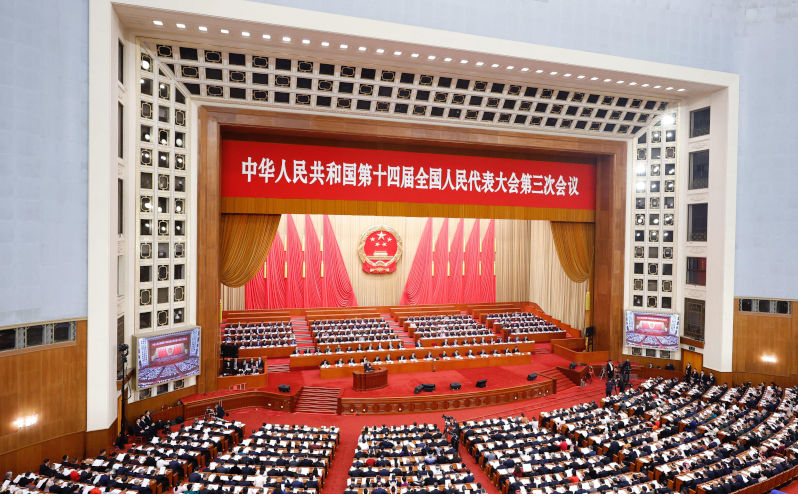China’s 2025 ‘Two Sessions’ emphasised stability and strategic focus, avoiding major surprises despite the volatile global landscape.
Premier Li Qiang presented familiar economic challenges and policy remedies, with a focus on innovation, particularly in the non-state sector. China is positioning itself as a leader in high-quality growth, with an emphasis on technology and education, as well as a clear shift away from reliance on foreign technology. Amid growing international uncertainty, China’s measured approach at the National People’s Congress reflects its readiness for a more self-reliant future.
For decades, the annual convening of the National People’s Congress — held alongside a meeting of the Chinese People’s Political Consultative Conference to make the “Two Sessions” — has been a matter of highly orchestrated theatre. There were moments in the 1990s, including when a third of NPC delegates voted against the Three Gorges Dam project. But those days of public displays of differences in opinion are long gone.
But, given the chaos in the outside world, particularly the US under Trump 2.0, there is something deeply significant about the 2025 NPC remaining free of major surprises.
The NPC is, after all, the highest organ of power in China – unlike the CPPCC, which is purely a consultative body. The tone and content of its deliberations merit attention, especially now that Chinese politics domestically is so opaque, even if the outcomes do not seem administratively consequential.
That the Two Sessions were so low key and almost workmanlike this year, despite chaos reigning in much of the rest of the world, is striking.
The meeting dutifully stated a target annual economic growth rate of 5% — an undramatic and unsurprising goal — and listed a widely acknowledged set of domestic problems, including local government debt, youth unemployment and the housing market. Li’s Government Work Report was heavy on rhetorical expressions of aspiration and light on hard data, with only a few specific goals for technology and job creation.
Yet the traditional mention of “complex” international conditions for once this year felt more than just formulaic.
This wider international context gave extra bite to the mention Li made to “changes not seen in a hundred years”. These are words that President Xi Jinping himself has used a lot, most notably when bidding farewell to Russian President Vladimir Putin in Moscow in 2023.
With the United States retreating into isolationism, the meaning is crystal clear – China is being pushed into action. The last time the United States pulled up the drawbridge in this way was nearly a century ago, before World War II. These are indeed interesting and very troubling times.
Beyond the geopolitical context, the main focus of the 2025 Two Sessions was not so much on any grand policy or economic announcements. Rather, the focus was on innovation, with an emphasis on the non-state sector and its role. In preparation for this, Xi met key entrepreneurs in Beijing on 17 February.
This was likely prompted by the dramatic launch of the free artificial intelligence app, DeepSeek. A 200-strong company linked to Zhejiang University developed the app, reportedly spending only a fraction of the development costs of its US competitors. Its launch in late January wiped US$1 trillion off the US stock exchange valuation. Liang Wenfeng, the founder of the company, attended the meeting with Xi, where the president extolled the virtues of the private sector and promised greater financial, legal and administrative support.
At the NPC, Chairman Zhao Leji, in his report on the legislative aims for the coming year, assured progress on a draft law containing these protections. Li recognised the sector’s contributions to employment, tax and, above all, the creation of innovative new technology.
As part of the attempt to push back against the United States and its waging of trade wars, with tariffs already imposed on some Chinese goods, the accelerated weaning off US and other foreign technology is now a national priority. While in the past, a deal of scepticism was permissible when hearing Chinese politicians’ rhetoric on this, today their claims need to be listened to more carefully.
As Li alluded to, the shift towards “high-quality” growth means China is evolving from a source of cheap labour to a hub of highly educated human capital. The country produced more STEM subject graduates than anywhere else in 2024, with India coming second. Many young people educated in the United States have now returned to China, finding the environment in other countries unconducive to their aspirations.
Funding for research and development, either through the government or companies like Huawei, now places the country second only to the United States. Whether the metric is peer-reviewed papers authored by Chinese scholars or rankings for Chinese universities, China is advancing rapidly.
The focus on building a knowledge economy and trying to produce high quality growth is commonsensical rather than headline grabbing.
In the current context, the fact that the world’s second-largest power is being prudent and predictable passes as good news. The bewildering, daily news coming from Washington, including the United States turning on traditional allies like Canada and its perpetually mutating approach to Russia’s war on Ukraine, means that under Trump 2.0, China has been offered an unusual opportunity.
While China might not be liked because of political differences, its predictability is widely welcomed. In these turbulent times, it is a relief that the 2025 NPC meeting was free of surprises.
Republished from EASTASIAFORUM, March 23, 2025
Kerry Brown is Professor of Chinese Studies and Director of the Lau China Institute at King’s College, London. He recently spoke about his important new book, “The Great Reversal: Britain, China and the 400 Year Contest for Power” (Yale University Press, 2024) with Richard Cullen.

